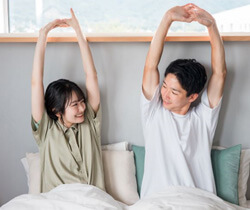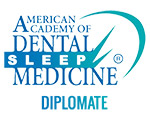Sleep Apnea Therapy – State College, PA
Reducing Snoring & Improving Quality of Sleep
Does your loved one snore loudly and continually? Snoring that occurs even occasionally can be an indication of something more serious. In fact, a snoring bed partner isn’t just keeping you from a restful night of sleep. They could be experiencing sleep apnea, a sleep disorder that needs the attention of a sleep medicine professional, offering sleep apnea therapy in State College.
What is sleep apnea?

Sleep apnea is a condition that causes the sufferer to stop breathing for up to ten seconds at a time. These abnormal pauses in breather can occur as many as 5-30 times an hour throughout the night. The most common form of sleep apnea is obstructive sleep apnea, or OSA. Obstructive sleep apnea is characterized by low muscle tone and soft tissue around the airway, sometimes the result of excess weight and sometimes simply the result of genetics. If the airway becomes blocked at night by soft tissues, snoring can occur, as well as other symptoms of sleep apnea.
If you wake up multiple times during the night, gasp for air, toss and turn, snore, and don’t feel rested although you’ve been in bed for a full eight hours, you may be suffering from sleep apnea. As with any sleep related disorder, sleep apnea causes significant and very serious daytime symptoms as well. Daytime drowsiness, headaches, irritability, poor memory function, confusions, moodiness and personality changes, and sexual dysfunction can all signify sleep apnea.
Complications of Sleep Apnea
Sleep apnea is a serious condition that carries with the risk for severe complications, such as:
- High blood pressure
- Heart attack
- Stroke
- Memory Loss
- Sudden and premature death
- Higher susceptibility to accidents
In addition, here are some risk factors for sleep apnea:
- Advanced age
- Obesity or weight gain
- Being male
- A narrowed airway
- Use of alcohol or sedatives
- Smoking
- Nasal congestion
- Family history
- Certain physical attributes such as large neck circumference
Why Choose Dr. Donald Marks for Sleep Apnea Treatment?
Thanks to Dr. Mark’s unique competency in dental sleep medicine and knowledge in alternative sleep apnea therapy treatments, he’s been honored as the 11th dentist in Pennsylvania to receive diplomate status from The American Academy of Dental Sleep Medicine (ABDSM.) This board is the leading national organization for dentists who treat snoring and obstructive sleep apnea (OSA) specifically with oral appliance therapy. Adults and children alike can largely benefit from this unique and proven approach to treating common symptoms of this chronic and potentially debilitating condition.
Sleep Apnea Therapy in State College
Did you know that you can receive sleep apnea therapy from your State College family dentist? Dr. Marks offers sleep apnea therapy that’s comfortable and that provides relief from snoring so you can get the rest you need. A simple oral appliance positions the bottom jaw forward, opening the airway and repositioning the tongue. Not only will you feel rested and rejuvenated in the morning, your loved one will too!
Understanding the Cost of Sleep Apnea Treatment

The cost of sleep apnea treatment can depend on a few factors. During your consultation, our team will make sure that you understand the financial aspect of your care, including your payment options. We do not want the process of paying for your therapy to be stressful, so you can depend on us to be straightforward with you about pricing. You can also be sure that the many benefits of high-quality sleep make treatment a truly wise investment!
Does Dental Insurance Cover the Cost of Sleep Apnea Treatment?

Dental insurance focuses on issues that directly affect the teeth and gums. Since sleep apnea is an airway problem, you should not expect your dental insurance to cover your treatment. However, your medical insurance is very likely to pay for at least a portion of your sleep apnea therapy.
Factors That Affect the Cost of Sleep Apnea Treatment

Some factors that can influence the cost of sleep apnea treatment include:
- The type of treatment you receive. CPAP therapy and oral appliance therapy are both popular ways to address sleep apnea. Their price depends on the specifics of each case, including the type of machine/appliance that is prescribed.
- The extent of your medical insurance. Most health plans cover sleep apnea treatment, but their deductibles, copays, and coinsurance can vary quite a bit. Our team can help you file claims and understand how your coverage applies.
Treat Your Sleep Apnea Now to Improve Your Health

We understand if you are initially reluctant to spend money on sleep apnea treatment. However, you can be confident that it may save you money in the long run by protecting your health.
For example, sleep apnea is associated with an increased risk of heart disease, diabetes, and dementia. Appropriate treatment can reduce the chances that you will develop these conditions, or it may delay their onset. As a result, you can enjoy an elevated quality of life and expect lower overall medical expenses in the years to come. Treatment may also make it safer for you to drive and prevent you from being involved in a serious — and expensive — auto accident.
Making Sleep Apnea Treatment More Affordable

Beyond insurance, we offer another provision that might make it easier to afford your care: Financing. Most patients are eligible for a low-interest plan through CareCredit. We can walk you through the easy application process. It is likely that you will be approved for a payment plan that works with your budget!
Sleep Apnea FAQs
Can I Diagnose Sleep Apnea on My Own?
You may have some symptoms of sleep apnea, but this doesn’t necessarily mean that you suffer from the condition. An official diagnosis is needed before you are able to receive treatment. Apple Watches and other tech may be able to suggest that you have sleep apnea, but they don’t comprehensively test for it. A sleep test is needed to diagnose sleep apnea. If you are interested in being tested for sleep apnea, let your dentist know.
Will My Sleep Apnea Go Away If I Lose Weight?
This is possible. Being overweight is a major risk factor for obstructive sleep apnea. This is because excess weight and tissue can block the airway. By losing weight, you can reduce this tissue. However, there is still a chance that you could continue to have sleep apnea even after losing excess weight. You would need to complete another sleep test to determine if you still have the condition.
How Should I Clean My Sleep Apnea Oral Appliance?
It is important that you keep your oral appliance clean to avoid the development of cavities, gum disease, and other dangerous infections. In the morning, right after you take out your oral appliance, you should gently brush it and risk it off. You should always keep it in a case when you aren’t using it. Denture cleanser can also be used to keep your oral appliances extra fresh.
Can I Have Oral Appliance Therapy If I Grind My Teeth?
Yes! Oral appliances are designed to endure the force of teeth grinding, so you don’t have anything to worry about. In fact, oral appliances can help to prevent tooth damage from teeth grinding. Sleep apnea and bruxism (teeth grinding and clenching) often go hand in hand.
Are There At-Home Remedies for Sleep Apnea?
There are some products that may help you to relax more when it is time for bed, like essential oils and weighted blankets. Not looking at your phone before bed and being physically active during the day can also help you fall asleep. However, the truth is that your oral appliance will have a much greater impact on the quality of your sleep. If you have sleep apnea, you need to address the actual problem by opening your airway during the night.




